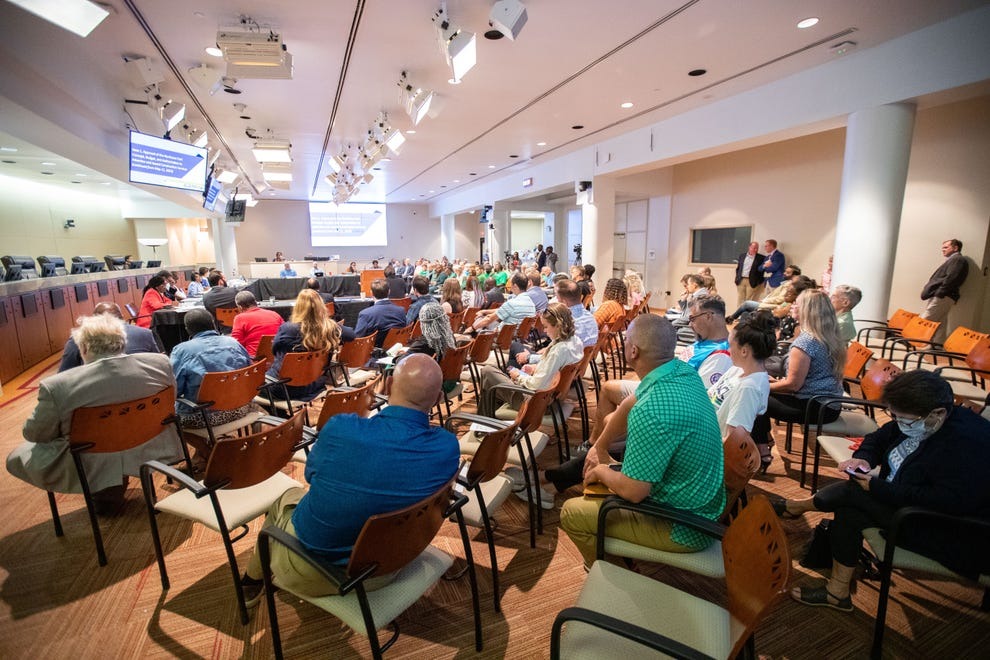By Arianna Otero, Tallahassee Democrat
In a recent vote, a majority of the Blueprint board of directors voted that sales tax revenues have a place in the capital city’s affordable housing crunch.
The Blueprint board, which is made up of all 12 city and county commissioners, voted Nov. 7 to begin the process of potentially changing its interlocal agreement so that it can purchase land for such projects.
The move comes amid a major shortage in affordable housing in Tallahassee and a push by advocates for Blueprint funding to build more. In August, the Blueprint board voted to work with the Capital Area Justice Ministry (CAJM), which has asked for $25 million in Blueprint funds to finance the construction of 500 new affordable rental units for residents who spend more than half of their income on rent and utilities.
“I think the time has come and the voters will agree because some of them are those in need, and we need to be creative, we need to be innovative. We need to do some things to help them meet the challenges of today,” said City Commissioner Dianne Williams-Cox.
Elected leaders, after a motion by City Commissioner Jack Porter, overruled their own staff in the 9-3 vote. In agenda materials, Blueprint staff urged commissioners against the amendment process that will pave the way for infrastructure funds to be used on such projects.
“Using sales surtax funds for affordable housing would result in insufficient funds to complete infrastructure projects approved and in various phases of planning and construction, and result in reduced funds intended to expand and diversify the local economy and attract, expand, retain, and create jobs,” staffers wrote.
That’s why Mayor John Dailey joined commissioners Christian Caban and Curtis Richardson in voting against the proposal. He noted that this would represent the first time in history that Blueprint would initiate the substantial amendment process on infrastructure.
“We have 27 projects that we have to build because it passed by referendum,” Dailey said. “I am extremely hesitant about opening Pandora’s Box that has never been done … in this intergovernmental agency.”
The vote comes as commissioners have voted to explore scaling back the Airport Gateway project amid ballooning costs to free up more cash for other priorities. The gateway was a signature Blueprint project “envisioned to create a beautiful, safety-enhanced, and multimodal gateway between the Tallahassee International Airport and Downtown Tallahassee.”
The Blueprint board oversees hundreds of millions of dollars in infrastructure and economic development projects. The Intergovernmental Agency, or IA, reviews and OKs projects funded by a special one-cent sales tax collected in Leon County. Voters approved the first sales-tax initiative in 1989 and the current one in 2014.
The substantial amendment process can take a while: It involves two public hearings and input from the Citizens Advisory Committee, the Technical Coordinating Committee and the Intergovernmental Management Committee, which is made up of City Manager Reese Goad and County Administrator Vince Long. Finally, the amendment has to get a supermajority vote from the board to pass.
“I don’t believe we can turn our backs, close our eyes, close our ears to the needs in this community,” said Leon County Commissioner Carolyn Cummings. “I’m not saying we can do it tomorrow, I’m not saying we can do it maybe even next year, but what we would be doing is setting the platform for commissioners that come after us.”
While the Blueprint board took early steps to broaden its infrastructure scope to include affordable housing, the process of making that a reality may take up to a year and may ultimately not garner enough votes. Another catch: Blueprint only has four meetings scheduled for 2024 in which to take public comment. Moreover, the board has no obligation to enact the amendment and if they do pass it, there is no current project in waiting.
Still members of the Capital Area Justice Ministry hailed the vote, calling it “an essential first step” in providing desperately needed low-income housing options.
“CAJM looks forward to working with staff and affordable rental housing experts to develop a project concept that will provide effective incentives for affordable rental housing developers to set aside more units for these families who face daily challenges paying for rent, food, transportation, health care, and childcare,” the group wrote on its website.
View the original story here.






